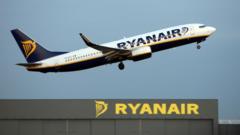As Germany prepares for its upcoming election, economic concerns are overshadowing traditional political debates. Companies like SKW Piesteritz are emblematic of the struggles faced by industries across the nation, with executives warning of potential job losses due to regulatory burdens and soaring energy costs. With the economic downturn affecting both workers and businesses, the urgency to bolster the country's industrial sector has reached a critical juncture. Local leaders emphasize that the next chancellor must prioritize economic revitalization to prevent prolonged hardship.
Germany's Economic Dilemma: The Stakes of Upcoming Elections

Germany's Economic Dilemma: The Stakes of Upcoming Elections
In a pivotal election influenced by economic turmoil, German voters weigh the future of their nation.
When Germans cast their votes on Sunday, the issues dominating their minds will largely stem from the economic turmoil plaguing the nation. Conversations with executives and workers highlight the dire situation at companies like SKW Piesteritz, which has had to reduce employee bonuses and close production facilities due to high operational costs and regulatory challenges. As a result, around 10,000 jobs are on the line in the economically struggling region of Lutherstadt Wittenberg.
“The struggle is real,” says local mayor Torsten Zugehör, emphasizing the precarious position of regional industries. Despite recent discussions focusing on immigration and international relations, it’s the anemic performance of the German economy that is striking a chord with voters. Many executives, politicians, and citizens agree that swift action is required from the next leader to restore the country's industrial might, which has seen better days.
Petr Cingr, chairman of SKW, reflects on the current state of affairs, claiming, “We have never been in such a dire economic position.” As the election looms, the message is clear: the future of German competitiveness hangs in the balance, and voters are ready to respond to an economic agenda that promises hope and recovery.
“The struggle is real,” says local mayor Torsten Zugehör, emphasizing the precarious position of regional industries. Despite recent discussions focusing on immigration and international relations, it’s the anemic performance of the German economy that is striking a chord with voters. Many executives, politicians, and citizens agree that swift action is required from the next leader to restore the country's industrial might, which has seen better days.
Petr Cingr, chairman of SKW, reflects on the current state of affairs, claiming, “We have never been in such a dire economic position.” As the election looms, the message is clear: the future of German competitiveness hangs in the balance, and voters are ready to respond to an economic agenda that promises hope and recovery.






















